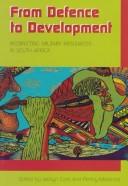| Listing 1 - 10 of 77 | << page >> |
Sort by
|
Book
ISBN: 346201093X Year: 1975 Publisher: Köln Kiepenheuer & Witsch
Abstract | Keywords | Export | Availability | Bookmark
 Loading...
Loading...Choose an application
- Reference Manager
- EndNote
- RefWorks (Direct export to RefWorks)
#gsdbS --- Militarism --- Antimilitarism --- Military policy --- Sociology, Military --- Chauvinism and jingoism --- Imperialism

ISBN: 080146708X 1322500509 0801467098 9780801467097 9780801472930 0801472938 9780801442582 0801442583 9781322500508 9780801467080 Year: 2013 Publisher: Ithaca, NY
Abstract | Keywords | Export | Availability | Bookmark
 Loading...
Loading...Choose an application
- Reference Manager
- EndNote
- RefWorks (Direct export to RefWorks)
In a book that is at once a major contribution to modern European history and a cautionary tale for today, Isabel V. Hull argues that the routines and practices of the Imperial German Army, unchecked by effective civilian institutions, increasingly sought the absolute destruction of its enemies as the only guarantee of the nation's security. So deeply embedded were the assumptions and procedures of this distinctively German military culture that the Army, in its drive to annihilate the enemy military, did not shrink from the utter destruction of civilian property and lives. Carried to its extreme, the logic of "military necessity" found real security only in extremities of destruction, in the "silence of the graveyard."Hull begins with a dramatic account, based on fresh archival work, of the German Army's slide from administrative murder to genocide in German Southwest Africa (1904-7). The author then moves back to 1870 and the war that inaugurated the Imperial era in German history, and analyzes the genesis and nature of this specifically German military culture and its operations in colonial warfare. In the First World War the routines perfected in the colonies were visited upon European populations. Hull focuses on one set of cases (Belgium and northern France) in which the transition to total destruction was checked (if barely) and on another (Armenia) in which "military necessity" caused Germany to accept its ally's genocidal policies even after these became militarily counterproductive. She then turns to the Endkampf (1918), the German General Staff's plan to achieve victory in the Great War even if the homeland were destroyed in the process-a seemingly insane campaign that completes the logic of this deeply institutionalized set of military routines and practices. Hull concludes by speculating on the role of this distinctive military culture in National Socialism's military and racial policies.Absolute Destruction has serious implications for the nature of warmaking in any modern power. At its heart is a warning about the blindness of bureaucratic routines, especially when those bureaucracies command the instruments of mass death.
Militarism --- Antimilitarism --- Military policy --- Sociology, Military --- Chauvinism and jingoism --- Imperialism --- History. --- Germany --- History, Military
Book
ISBN: 3110418851 3110418754 9783110418767 3110418762 9783110418750 3110419734 9783110419733 9783110419733 9783110418859 Year: 2017 Publisher: Berlin, Germany
Abstract | Keywords | Export | Availability | Bookmark
 Loading...
Loading...Choose an application
- Reference Manager
- EndNote
- RefWorks (Direct export to RefWorks)
This volume works through spatio-temporal concepts to be found in imperial practices and their representations in a wide range of media. The individual cases investigated in the volume cover a broad spectrum of historical periods from ancient times up to the present. Well-known international scholars treat special cases of the topic, using cutting-edge theory and approaches stemming from historical, cartographic, religious, literary, media studies, as well as ethnography.
Militarism --- Antimilitarism --- Military policy --- Sociology, Military --- Chauvinism and jingoism --- Imperialism --- History. --- Germany --- History, Military

ISBN: 1612340636 1429490179 9781429490177 9781574886542 1574886541 9781612340630 1574886533 9781574886535 Year: 2005 Publisher: Washington, D.C. Potomac Books
Abstract | Keywords | Export | Availability | Bookmark
 Loading...
Loading...Choose an application
- Reference Manager
- EndNote
- RefWorks (Direct export to RefWorks)
Analyzes the storied career of one of Germany's most famous military leaders
Militarism --- Generals --- Presidents --- Antimilitarism --- Military policy --- Sociology, Military --- Chauvinism and jingoism --- Imperialism --- History. --- Hindenburg, Paul von, --- Germany --- Politics and government

ISBN: 2718601256 Year: 1979 Publisher: Paris Galilée
Abstract | Keywords | Export | Availability | Bookmark
 Loading...
Loading...Choose an application
- Reference Manager
- EndNote
- RefWorks (Direct export to RefWorks)
Imperialism --- Militarism --- 321.64:355 --- Antimilitarism --- Military policy --- Sociology, Military --- Chauvinism and jingoism --- Colonialism --- Empires --- Expansion (United States politics) --- Neocolonialism --- Political science --- Anti-imperialist movements --- Caesarism
Book
ISBN: 9788431577 9789788431572 9788431348 9789788431343 9789788431344 Year: 2013 Publisher: Ibadan
Abstract | Keywords | Export | Availability | Bookmark
 Loading...
Loading...Choose an application
- Reference Manager
- EndNote
- RefWorks (Direct export to RefWorks)
Most Nigerians, when they talk about Nigeria, will always refer to her with bubbling jingoism as 'giant of Africa' or 'our great nation, Nigeria' but fail to ask 'giant of what?' Goodness or Evil? Productivity or Consumption? Success or Failure? Meritocracy or Mediocrity? Hollowness or Substance? Capturing the "mood of the nation" this book offers diagnosis on the country which are broad-based, instructive and well presented. Part I outlines the developmental stages of Nigeria while Part II gives an in depth diagnosis of the major problems besetting Nigeria, following Part III gives examples of nations and leadership traits Nigeria could emulate.
Nigeria --- Economic conditions --- Social conditions --- Politics and government --- History --- Militarism --- Antimilitarism --- Military policy --- Sociology, Military --- Chauvinism and jingoism --- Imperialism --- Politics and government.
Book
ISBN: 9353280222 938606250X 9386062496 9789386062499 9789386062482 9386062488 9789386062482 9789386062505 9789353280222 Year: 2017 Publisher: Los Angeles, CA : SAGE Publications, Inc.,
Abstract | Keywords | Export | Availability | Bookmark
 Loading...
Loading...Choose an application
- Reference Manager
- EndNote
- RefWorks (Direct export to RefWorks)
What might link a group of middle-class Pakistani women sipping coffee demurely in a living room, with the fiery young women in black burqas threatening shopkeepers in Islamabad? When and how do an adolescent girl's aspirations translate into the maturing of a social and political revolution in urban Pakistan?
Militarism --- Islam and politics --- Muslim women --- Islamic women --- Women, Muslim --- Women --- Antimilitarism --- Military policy --- Sociology, Military --- Chauvinism and jingoism --- Imperialism --- Social conditions.

ISBN: 0889368538 1552501515 9780889368538 9781552501511 1417535989 9781417535989 1280717750 9786610717750 Year: 1998 Publisher: Ottawa, ON, Canada
Abstract | Keywords | Export | Availability | Bookmark
 Loading...
Loading...Choose an application
- Reference Manager
- EndNote
- RefWorks (Direct export to RefWorks)
Remember the global peace dividend - the budget surpluses that were supposed to result from the raising of the Iron Curtain and the end of the arms race? As war-torn societies in the Middle East, Latin America, and parts of Africa found peace and began building democratic societies, governments were supposed to use the money they once spent on the military to better meet basic human needs. But has it happened?
Polemology --- South Africa --- Militarism --- National security --- Sustainable development --- Antimilitarism --- Military policy --- Sociology, Military --- Chauvinism and jingoism --- Imperialism --- Africa, South --- Military policy.
Book
ISBN: 090758201X Year: 1981 Publisher: Leamington Spa Berg
Abstract | Keywords | Export | Availability | Bookmark
 Loading...
Loading...Choose an application
- Reference Manager
- EndNote
- RefWorks (Direct export to RefWorks)
Militarism --- Civil-military relations --- Sociology, Military --- Military sociology --- Armed Forces --- Armies --- Peace --- War --- War and society --- Military and civilian power --- Military-civil relations --- Executive power --- Military government --- Antimilitarism --- Military policy --- Chauvinism and jingoism --- Imperialism

ISBN: 0521672317 0521856361 9780521672313 9780521856362 0511137648 9780511137648 0511134479 9780511134470 9780511135477 0511135475 1280284234 9781280284236 9786610284238 6610284237 1107155614 9781107155619 0511201834 9780511201837 0511311958 9780511311956 Year: 2006 Publisher: Cambridge Cambridge university press
Abstract | Keywords | Export | Availability | Bookmark
 Loading...
Loading...Choose an application
- Reference Manager
- EndNote
- RefWorks (Direct export to RefWorks)
This groundbreaking book challenges the central theme of the existing histories of twentieth-century Britain, that the British state was a welfare state. It argues that it was also a warfare state, which supported a powerful armaments industry, and analyses the relations of science, technology, industry and the military.
Defense industries --- Historiography --- Militarism --- Antimilitarism --- Military policy --- Sociology, Military --- Chauvinism and jingoism --- Imperialism --- Armaments industries --- Arms sales --- Military sales --- Military supplies industry --- Munitions --- Sale of military equipment --- Industries --- Arms transfers --- History --- Great Britain --- Economic conditions --- Military policy. --- Politics and government
| Listing 1 - 10 of 77 | << page >> |
Sort by
|

 Search
Search Feedback
Feedback About UniCat
About UniCat  Help
Help News
News